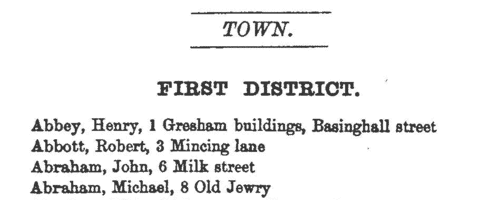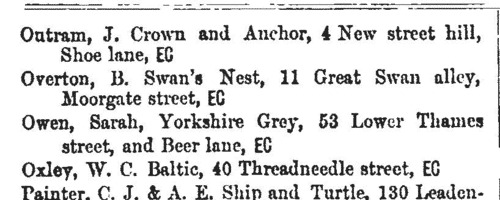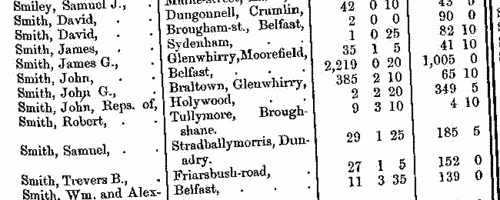Whisker Surname Ancestry ResultsOur indexes 1000-1999 include entries for the spelling 'whisker'. In the period you have requested, we have the following 47 records (displaying 21 to 30): Single Surname Subscription | | | Buying all 47 results of this search individually would cost £274.00. But you can have free access to all 47 records for a year, to view, to save and print, for £100. Save £174.00. More... |
These sample scans are from the original record. You will get scans of the full pages or articles where the surname you searched for has been found. Your web browser may prevent the sample windows from opening; in this case please change your browser settings to allow pop-up windows from this site. Traders and professionals in London
(1856)
The Post Office London Directory for 1856 includes this 'Commercial and Professional Directory', recording over 100,000 individuals. WHISKER. Cost: £4.00.  | Sample scan, click to enlarge

|  Persons of standing recommending London police recruits
(1843-1857) Persons of standing recommending London police recruits
(1843-1857)
The Metropolitan Police Register of Joiners (MEPO 4/334) lists policemen joining the force 1 January 1843 to 1 April 1857 (warrant numbers 19893 to 35804). The register is alphabetical, in so far as the recruits are listed chronologically grouped under first letter of surname. It gives Date of Appointment, Name, Number of Warrant, Cause of Removal from Force (resigned, dismissed, promoted or died), and Date of Removal. Although the register was closed for new entrants at the end of 1842, the details of removals were always recorded, some being twenty or more years later. Those recruits not formerly in the police, the army, or some government department, were required to provide (normally) at least two letters of recommendation from persons of standing, and details of these are entered on the facing pages. Where a recruit was only recently arrived in the metropolis, the names and addresses of the recommenders can be invaluable for tracing where he came from. Those recruits not formerly in the police, the army, or some government department, were required to provide (normally) at least two letters of recommendation from persons of standing, and details of these are entered on the facing pages: the names in these are indexed here (the police recruits are indexed separately and not included here). Recruits transferred from other forces or rejoining the force did not normally need recommendations - in the latter case, former warrant numbers are given - but some recommendations are from police inspectors, even other constables. Recruits coming from the army sometimes have general military certificates of good conduct, but most often have a letter from their former commanding officer; recruits recommended by government departments (most often the Home Office) similarly have letters from the head of department. But the great majority of the names and addresses in these pages are of respectable citizens having some sort of personal acquaintance with the recruit. Where more than two recommendations were provided, the clerk would only record one or two, with the words 'and others'. Tradesmen are sometimes identified as such by their occupations; there are some gentry. Although the bulk of these names are from London and the home counties, a scattering are from further afield throughout Britain and Ireland. WHISKER. Cost: £8.00.  | Sample scan, click to enlarge

|  Members of the British military train fighting in China
(1856-1860) Members of the British military train fighting in China
(1856-1860)
The China Medal was awarded to soldiers and sailors who took part in the prosecution of the war against the Chinese from 1856 to 1860. Separate clasps were awarded for men who had been in receipt of the China Medal of 1842; for being actually present at Canton on 28 and 29 December 1857, when that city was bombarded and finally captured; for being actually engaged in the operations which ceased with the first capture of the Taku Forts, 20 May 1858, and led to the Treaty of Tientsin; for being actually present at the capture of the Taku Forts 21 August 1860; and for being actually present before Pekin the day the gate of that city was given up to the allied (British and French) army, viz. on 13 October 1860. Among the recipients of the medals were members of the Military Train.WHISKER. Cost: £8.00.  | Sample scan, click to enlarge

| Tabular record of Wesleyan mortality
(1860)
The Christian Miscellany and Family Visiter, a Wesleyan Methodist monthly published in London, carried, in most issues, a Tabular Record of Mortality, listing recent deaths. The columns of the table are: Name, Residence, [Methodist] Circuit, Age, and Date of Death.WHISKER. Cost: £6.00.  | Sample scan, click to enlarge

| Long-stay Paupers in Workhouses: Sculcoates
(1861)
This comprehensive return by the Poor Law Board for England and Wales in July 1861 revealed that of the 67,800 paupers aged 16 or over, exclusive of vagrants, then in the Board's workhouses, 14,216 (6,569 men, 7,647 women) had been inmates for a continuous period of five years and upwards. The return lists all these long-stay inmates from each of the 626 workhouses that had been existence for five years and more, giving full name; the amount of time that each had been in the workhouse (years and months); the reason assigned why the pauper in each case was unable to sustain himself or herself; and whether or not the pauper had been brought up in a district or workhouse school (very few had). The commonest reasons given for this long stay in the workhouse were: old age and infirm (3,331); infirm (2,565); idiot (1,565); weak mind (1,026); imbecile (997); and illness (493). WHISKER. Cost: £6.00.  | Sample scan, click to enlarge

| London Members of the National Provident Institution
(1870)
The membership lists of the National Provident Institution were issued in separate volumes for Town (i. e., London and vicinity) and Country members. This list of Town Members is arranged alphabetically within fifteen districts (1 City; 2 Strand, Bloomsbury; 3 Pentonville, Islington, Highbury, Holloway; 4 Soho, St James's, Marylebone; 5 Camden Town, Kentish Town, Hampstead, Highgate; 6 Regent's Park, St John's Wood, Kilburn; 7 Paddington, Bayswater, Notting Hill, Acton, Ealing; 8 Brompton, Kensington, Hammersmith; 9 Westminster, Pimlico, Chelsea, Fulham; 10 Bishopsgate Without, Shoreditch, Finsbury, City Road, Hoxton; 11 Kingsland, De Beauvoir Town, Mildmay Park, Stoke Newington, Stamford Hill, Tottenham, Edmonton; 12 Whitechapel, Docks, Stepney, Limehouse, Poplar, Plaistow, Barking; 13 Spitalfields, Hackney Road, Bethnal Green, Mile End, Bow, Old Ford, Stratford; 14 Dalston, Hackney, Homerton, Clapton; 15 Southwark). Full name is given, surname first, and full postal address except in those few cases where the member subscribed through an agent. WHISKER. Cost: £4.00.  | Sample scan, click to enlarge

| Innkeepers and Publicans in London north of the Thames
(1874)
Henry Downes Miles compiled this London and Suburban Licensed Victuallers', Hotel and Tavern Keepers' Directory, which also had sections listings brewers, maltsters, hop factors, distillers and rectifiers of the United Kingdom.WHISKER. Cost: £6.00.  | Sample scan, click to enlarge

| Freeholders in county Antrim
(1873-1875)
Owners of an acre or more, whether resident there or elsewhere: with their addresses; the acreage; and a valuation of the land. The survey commenced in February 1873, the last returns being received in November 1875.WHISKER. Cost: £4.00.  | Sample scan, click to enlarge

| Debtors
(1880)
Bills of sale (binding assets to a creditor/lender) in England and Wales, October to December 1880WHISKER. Cost: £6.00.  | Sample scan, click to enlarge

| Debtors, Insolvents and Bankrupts
(1880)
Bills of sale (binding assets to a creditor/lender), insolvencies and bankruptcies in England and Wales, July to September 1880WHISKER. Cost: £6.00.  | Sample scan, click to enlarge

|
Research your ancestry, family history, genealogy and one-name study by direct access to original records and archives indexed by surname.
|













